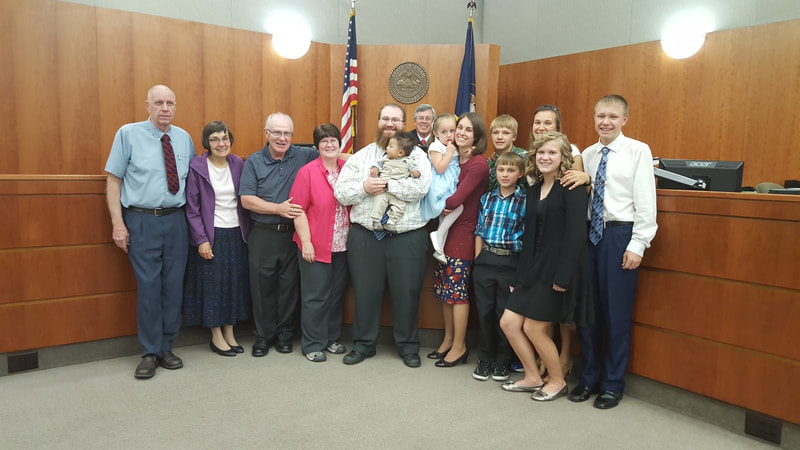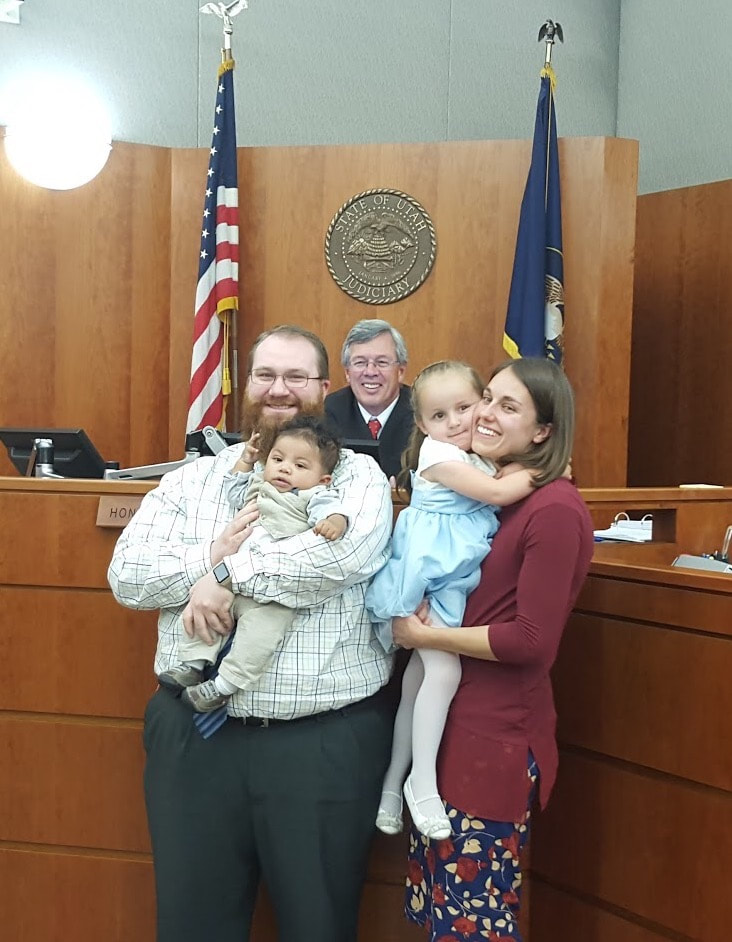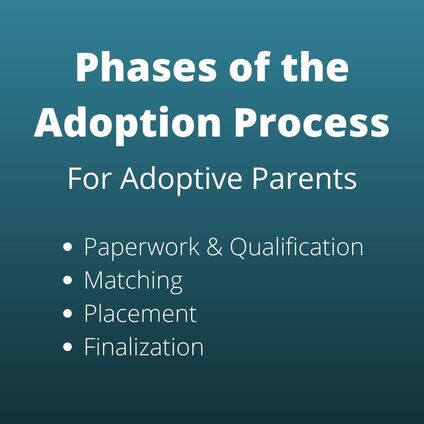
Tim and I are already experiencing something new this time around with adoption. We have kids, and old enough kids, that we needed to explain to them the adoption process and help them manage their expectations around the process.
Both our kids were very excited at the prospect of having another sibling. But Tim and I know from personal experience, that the adoption process can be an emotional roller coaster. We thought to break down adoption into phases to help them understand it better and here's what we came up with.
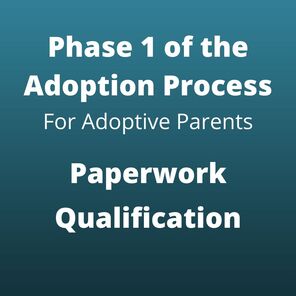
Once a couple has decided to pursue adoption they start the paperwork and qualification process. Many choose to work with an agency and some choose to pursue a private adoption. Either way, a home study must be completed. Agencies have some additional paperwork as well.
A home study is an extensive study of the adoptive parents to ensure that they can provide a safe and healthy home for a child, financially, mentally, emotionally support a child, and have good enough health and a long enough life expectancy to raise a child.
Much of this process involves filling out paperwork: questionnaires about yourself, your family of origin, and your parenting style, financial statements, medical reports filled out by a doctor, employment verification, your acceptable placement conditions, and recommendations from family members and non-family members. We also have to get multiple background checks.
Hopeful adoptive parents are also required to complete a minimum of 10 hours of adoption training. Some of the most helpful training topics for us have been appropriate adoption language and adoption panels with birthparents, adoptees, and adoptive parents.
Once this part of the process is finished, a case worker visits your home to make sure that it is a safe environment for a child. This case worker also interviews the couple together and as individuals. Using the visit, interviews, and all the paperwork, the case worker writes up a document called the home study. Later in the adoption process, this home study will be presented to a judge when he is considering finalizing the adoption.
This part of the process can be the fastest and most controllable part of the process for the adoptive parents. We were able to complete our home study process in 2 months.
A home study is an extensive study of the adoptive parents to ensure that they can provide a safe and healthy home for a child, financially, mentally, emotionally support a child, and have good enough health and a long enough life expectancy to raise a child.
Much of this process involves filling out paperwork: questionnaires about yourself, your family of origin, and your parenting style, financial statements, medical reports filled out by a doctor, employment verification, your acceptable placement conditions, and recommendations from family members and non-family members. We also have to get multiple background checks.
Hopeful adoptive parents are also required to complete a minimum of 10 hours of adoption training. Some of the most helpful training topics for us have been appropriate adoption language and adoption panels with birthparents, adoptees, and adoptive parents.
Once this part of the process is finished, a case worker visits your home to make sure that it is a safe environment for a child. This case worker also interviews the couple together and as individuals. Using the visit, interviews, and all the paperwork, the case worker writes up a document called the home study. Later in the adoption process, this home study will be presented to a judge when he is considering finalizing the adoption.
This part of the process can be the fastest and most controllable part of the process for the adoptive parents. We were able to complete our home study process in 2 months.
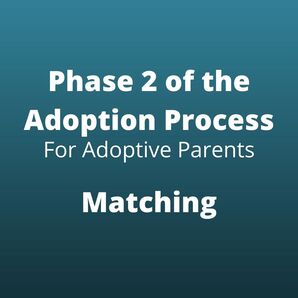
In this phase of adoption, hopeful adoptive parents and expectant parents who wish to place their baby for adoption are looking to be matched with each other. The expectant parents will choose a couple (or adoptive parent) they wish to place their baby with and then the adoptive parents can choose whether or not to accept.
In my opinion, the matching phase of the adoption process is the hardest phase for adoptive parents. While there are actions we can take, the timeframe on this phase is out of our hands . . . we really have no control.
This phase takes no set amount of time and can range widely. Both times we have adopted this phase was about 2 years. Often times those going through an agency have shorter wait times than those adopting privately, but not always.
When using an agency, there's a central place where expectant parents and hopeful adoptive parents come. The expectant parents will be presented with the profiles of the hopeful adoptive parents working with that agency who fit their requirements. This means hopeful adoptive parents are being "seen" by expectant parents.
In a private adoption, word of mouth is huge! We rely on expectant parents hearing about us from a friend or an acquaintance or even a friend of a friend. We do many things to try and spread the word: websites, social media, pass-a-long cards, willing to open our mouths and talk to others . . .It feels weird to "market" ourselves and was hard to do at first.
When an expectant parent is interested in a hopeful adoptive couple there is usually a period of time where they converse with each other (sometimes through a case worker, sometimes directly) to get to know each other. Some expectant parents make decisions quickly and some take longer.
The first time we adopted, we conversed with our daughter's birth mother through email for about a month before meeting in person. She then choose us to be her baby's adoptive parents.
The second time we adopted, we submitted our profile to an expectant mom and heard back within a couple days that she had chosen us. We never interacted directly with one another until our son was born!
In my opinion, the matching phase of the adoption process is the hardest phase for adoptive parents. While there are actions we can take, the timeframe on this phase is out of our hands . . . we really have no control.
This phase takes no set amount of time and can range widely. Both times we have adopted this phase was about 2 years. Often times those going through an agency have shorter wait times than those adopting privately, but not always.
When using an agency, there's a central place where expectant parents and hopeful adoptive parents come. The expectant parents will be presented with the profiles of the hopeful adoptive parents working with that agency who fit their requirements. This means hopeful adoptive parents are being "seen" by expectant parents.
In a private adoption, word of mouth is huge! We rely on expectant parents hearing about us from a friend or an acquaintance or even a friend of a friend. We do many things to try and spread the word: websites, social media, pass-a-long cards, willing to open our mouths and talk to others . . .It feels weird to "market" ourselves and was hard to do at first.
When an expectant parent is interested in a hopeful adoptive couple there is usually a period of time where they converse with each other (sometimes through a case worker, sometimes directly) to get to know each other. Some expectant parents make decisions quickly and some take longer.
The first time we adopted, we conversed with our daughter's birth mother through email for about a month before meeting in person. She then choose us to be her baby's adoptive parents.
The second time we adopted, we submitted our profile to an expectant mom and heard back within a couple days that she had chosen us. We never interacted directly with one another until our son was born!
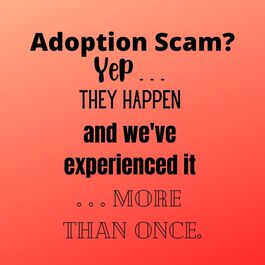
Tim and I have learned to stay emotionally guarded throughout the adoption process. There's a lot that can happen and it can be emotionally crushing if you're not prepared for it.
The other day a family member asked how the adoption process was coming and Tim replied, "Well, we've made it through the obligatory scam, so it's progressing." His comment was made in jest, but the possibility of a scam is a real problem throughout the process, especially during the matching phase.
There's a misconception that scammers are in it for money. While this is sometimes true, it is not always. Both times Tim and I have been scammed, no money was ever asked for or discussed. Sometimes it is solely an emotional scam . . . which is no picnic.
We had a young woman try to scam us just last week! Luckily, Tim and I have enough training and experience that we caught onto the ruse right away. There were several red flags. This girl texted us A LOT in a single afternoon and then stayed up until 11:00 pm her time to talk with us on the phone. She was occasionally snippy with me in her texts. She offered "proof of pregnancy" without us even asking for it. She wasn't working with an agency or an attorney, yet used appropriate adoption language.
We decided to talk with the case worker who did our home study and she agreed that it was a scam. She warned us of a girl named Gabby that often scams couples she works with. She told us about an episode on Dr. Phil about this very girl. Tim and I watched it and are convinced that this "16-year-old Hayley" is indeed the Gabby spoken of. Her voice sounded the same and she fit the MO perfectly. In fact, I wouldn't be surprised if the Gabby is the same girl who scammed us back in 2011. We'll probably never know, but we've learned what to watch for so we don't get taken again.
You can check out the Dr. Phil show here: https://www.youtube.com/watch?v=WVIfgdvG0Js...
The other day a family member asked how the adoption process was coming and Tim replied, "Well, we've made it through the obligatory scam, so it's progressing." His comment was made in jest, but the possibility of a scam is a real problem throughout the process, especially during the matching phase.
There's a misconception that scammers are in it for money. While this is sometimes true, it is not always. Both times Tim and I have been scammed, no money was ever asked for or discussed. Sometimes it is solely an emotional scam . . . which is no picnic.
We had a young woman try to scam us just last week! Luckily, Tim and I have enough training and experience that we caught onto the ruse right away. There were several red flags. This girl texted us A LOT in a single afternoon and then stayed up until 11:00 pm her time to talk with us on the phone. She was occasionally snippy with me in her texts. She offered "proof of pregnancy" without us even asking for it. She wasn't working with an agency or an attorney, yet used appropriate adoption language.
We decided to talk with the case worker who did our home study and she agreed that it was a scam. She warned us of a girl named Gabby that often scams couples she works with. She told us about an episode on Dr. Phil about this very girl. Tim and I watched it and are convinced that this "16-year-old Hayley" is indeed the Gabby spoken of. Her voice sounded the same and she fit the MO perfectly. In fact, I wouldn't be surprised if the Gabby is the same girl who scammed us back in 2011. We'll probably never know, but we've learned what to watch for so we don't get taken again.
You can check out the Dr. Phil show here: https://www.youtube.com/watch?v=WVIfgdvG0Js...
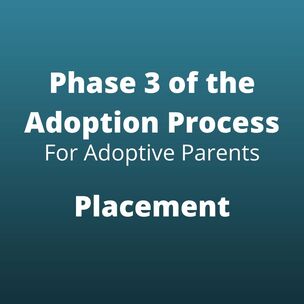
Once an adoptive couple is matched with an expectant mom they start preparing for placement. The time between matching and placement can be months, weeks, days, or even hours. When we adopted our daughter we had nearly 4 months between being matched and when she was born and placed with us. For our son it was about 1 month.
This time can be really exciting as you prepare for a baby. Some choose to share the news openly, have baby showers, and start collecting everything they need. Others stay more reserved until it gets much closer. Expectant parents have no obligation at this point to go through with the placement. They can change their minds . . . and they have every right to do so. So we find it wise to still remain a bit emotionally guarded.
Before placement can happen, relinquishment of parental rights must be signed. Expectant fathers can sign before the baby is born, but expectant mothers must wait for a period of time after giving birth. After they have signed they have a revocation period where they can change their minds. The exact amount of time varies from state to state, but it can be anywhere from one week to 30 days. This can be a very nerve-wracking time for adoptive parents as they are home with baby, but feeling nervous about the what-if.
Some birth mothers choose to have a placement ceremony and some choose to not have any ceremony at all. We have experienced both and either way it's a very bittersweet . . . "Bittersweet" is the perfect word to describe placing a baby for adoption. There is so much sadness, grief, joy, and rejoicing all in the same room and in the same beings at one time. It's an indescribable experience.
You can read about Kaylee's placement ceremony here.
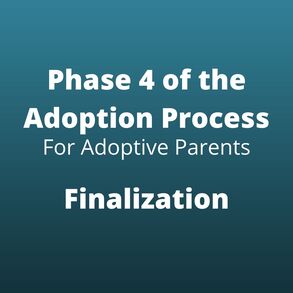
The final phase of adoption is the finalization phase, the easiest and least emotionally taxing. A child must live in your home for a minimum of 6 months before the adoption can be finalized. During this time we get at least one visit from a case worker to see how the adoptee and family are adjusting. If all looks good we can schedule a court date. The judge will review the home study we completed in phase 1, the relinquishment of parental rights from the birth parents, other paperwork, and meet with the family. If he doesn't find anything concerning he will finalize the adoption and everything, legally, is as if the child were born to us.
When we finalized Kaylee's adoption, we were able to "appear" in court over speaker phone because of the nature of living in bush Alaska. Unfortunately, the relinquishment of parental rights paperwork was not filled out appropriately. The judge explained he wanted to make sure everything was done correctly so it didn't create problems in the future. We had to schedule another court date and have our attorney work on correcting the paperwork. Everything went smoothly after that.
When we finalized Uriah's adoption we were able to attend in person with family in attendance as well. It was such a great experience.
When we finalized Kaylee's adoption, we were able to "appear" in court over speaker phone because of the nature of living in bush Alaska. Unfortunately, the relinquishment of parental rights paperwork was not filled out appropriately. The judge explained he wanted to make sure everything was done correctly so it didn't create problems in the future. We had to schedule another court date and have our attorney work on correcting the paperwork. Everything went smoothly after that.
When we finalized Uriah's adoption we were able to attend in person with family in attendance as well. It was such a great experience.
Email us: [email protected]
Follow us on Instagram @timandkaitlynhopetoadopt
Follow us on Facebook: Tim and Kaitlyn Want to Adopt!
Contact Us
Follow us on Instagram @timandkaitlynhopetoadopt
Follow us on Facebook: Tim and Kaitlyn Want to Adopt!
Contact Us
